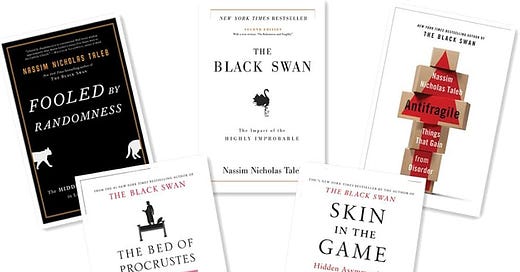Deep, hard to digest, ground breaking and revolutionary: these are the terms I would use to describe Nassim Taleb’s works. He has to be the find of the year for me. There has been a literal shift in perspective in my mindset after just reading 2 of his books: Black Swan and Antifragile. It’s a high concept comtemporary philosophy, and I’m sure I am gonna take a few more years to digest the philosophy.
Anyway, in this blog I am not writing about the books. I am just going to give you short ‘nuggets’ or ‘effects’ which he has talked in his books. Think about each one of them and try to relate them. Can you come up with examples of your own?
Here goes:
1. Lindy Effect
The longer something non-perishable has survived, the longer it can be expected to last.
Example:
An ancient text like the Mahabharata continues to be studied and quoted today. People from different cultures still find wisdom in it, suggesting it will likely remain relevant long after many modern books fade away.
A technology like the hammer has hardly changed over centuries. It works well, and its longevity implies it is unlikely to be replaced anytime soon.
All the classics, have stood the test of time. There’s a good chance they will stay relevant for more coming centuries.
2. Antifragility
Some things thrive and grow when exposed to volatility, randomness, or stress.
Example:
A small restaurant in a tough neighborhood adjusts constantly to survive. It faces unpredictable customer flow, changing supply prices, and seasonal shocks. Over time, it becomes more agile, more resilient, and outlasts trendier places with stable but fragile business models.
While exercising, your mustles experience stress, but the stress itself make them more stronger.
Your immune system improves after recovering from mild infections. Each exposure trains it, making you stronger in the long run.
3. Black Swan Events
Events that are highly improbable, unpredictable, and carry massive consequences.
Example:
No one forecasted how covid erupted.
All the major terror attacks were improbable. No one could predict them.
Another: the rise of the internet caught most traditional media companies off guard. They dismissed it at first, only to be overwhelmed by its reach and scale.
4. Skin in the Game
You should not make decisions for others if you don’t bear the consequences yourself.
Example:
A bridge engineer who has to drive over the bridge every day is likely to take safety more seriously than a bureaucrat approving designs from a distance.
A financial analyst who recommends risky investments but keeps their own money in safe bonds has no real cost if things go wrong for others.
5. Via Negativa
Improving things by removing what is harmful, instead of adding more.
Example:
Someone with chronic headaches might try dozens of medications, but simply removing caffeine or artificial sweeteners could solve the problem entirely.
In investing, not making frequent trades and just avoiding bad assets often beats trying to predict winners.
6. Nonlinearities
In complex systems, small inputs can lead to disproportionate outcomes.
Example:
A small snowball on the wrong slope can trigger a massive avalanche. The system was stable until that point, and then everything collapses suddenly.
Burnout at work can feel fine for months, then one extra email on a bad day pushes someone to quit unexpectedly.
7. Barbell Strategy
Combining extreme caution with extreme risk, avoiding the middle path which can be deceptively dangerous.
Example:
A writer works a stable part-time job to cover rent, but uses the rest of their time to pursue bold, creative projects with uncertain payoffs. This way, they don’t drown from bills, but still expose themselves to potential outsized success.
An investor holds 90 percent in cash or bonds, and 10 percent in high-risk startups. They protect most of their capital but still have a shot at major gains.
8. Narrative Fallacy
Our mind tries to connect events into stories, even if they were actually random.
Example:
After a startup succeeds, people craft a perfect story about the founder’s vision and genius. They ignore the luck, timing, and randomness that played just as large a role.
A sports team wins a championship, and commentators talk about “heart” and “momentum”, forgetting that a missed shot by the opponent could have changed everything.
More to come, deep dive into each of his books in the future newsletters. fascinating writer, do try reading him.
Thank you!





love that you read . Honestly so few are the people who actually read him . you are probably like top 5% smartest in the world